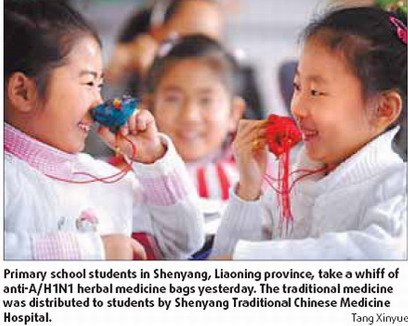
China hopes to be among the first countries ready with an A/H1N1 vaccination program for babies and children aged 6 months to 3 years.

The vaccine, which has already been administered voluntarily to around 17 million people in China, is currently unavailable to the under-3s on safety grounds.
But Beijing says it is now ready to start testing its home-grown vaccination on the under-3s in a bid to protect as many people as possible at a time when the pandemic is picking up steam and sickening more and more people nationwide.
Last week alone, the virus killed 28 people across the country.
Trials on babies and children could begin within the week, said Liang Xiaofeng, director of the Chinese Center for Disease Control and Prevention (CDC)'s immunization center.
About 13,000 volunteers took part in the initial trial of the vaccine several months ago but Liang said trials before rolling out the vaccine to the under-3s would likely be on a smaller scale.
The H1N1 vaccination program began in late September. Out of the millions vaccinated so far, two people reportedly died after receiving shots. The government said the deaths were coincidental and not linked to the vaccine.
"The vaccine has proven to be safe and effective," said Zhao Kai, leader of the team of experts responsible for the H1N1 flu vaccine and a member of the Chinese Academy of Engineering.
"Most of the 1,000 strong adverse reactions were, in fact, no stronger than a sore arm or a low fever," Zhao said.
Unlike the seasonal flu, which is more likely to strike the elderly, the H1N1 virus has been hitting younger adults and children particularly hard, international studies indicate.
Feng Zijian, director of the emergency response department affiliated to the CDC, told China Daily there have been H1N1 deaths among children under 3 but he declined to give a number.
According to clinical trials in the US, babies and small children would need two doses of the vaccine, instead of the single dose given to adults, because the immune systems of children are less developed.
The Ministry of Health said last week it will soon consider making the vaccine available to pregnant women because they are understood to be particularly vulnerable to the potentially lethal disease.
If they are infected, pregnant women are also at a much higher risk of developing a severe illness and dying, researchers said.
However, Liang said a trial of the vaccine among pregnant women has been ruled out for the moment.
As of Monday, China had reported 69,160 H1N1 cases on the mainland, including 53 deaths.
More than half of the deaths happened between Nov 9 and Nov 15.